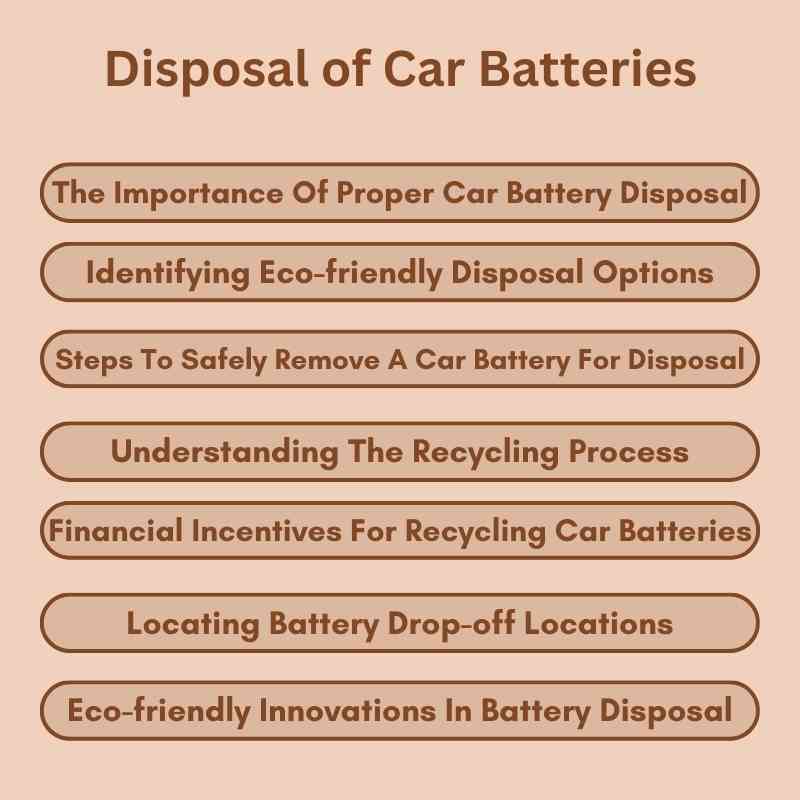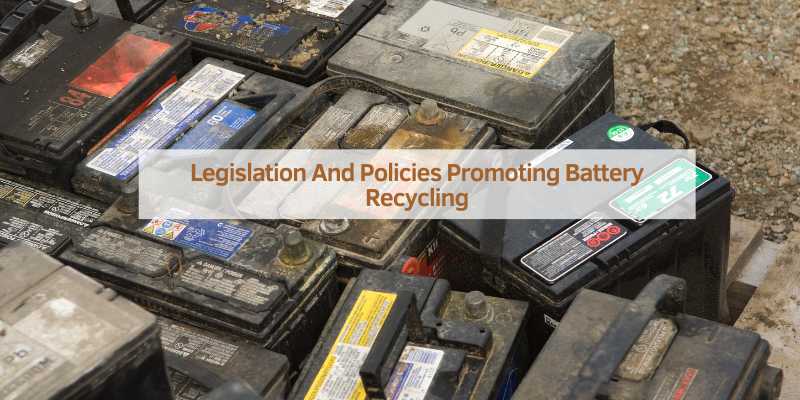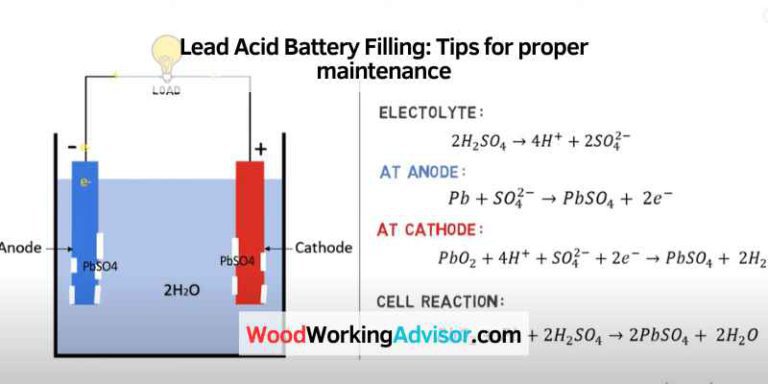Disposal of Car Batteries: Eco-Friendly Solutions
To dispose of a car battery, you can take it to a scrap metal facility, garage, or local recycling center. If you are replacing the battery in a car, you can often turn in the old battery at the same place you purchase the new one.
If you are scrapping the entire car, it can be easiest to leave the battery in the car. It is important to properly dispose of car batteries as they contain hazardous materials that can harm the environment. We will discuss why it is necessary to dispose of car batteries, how to dispose of them safely, and the benefits of recycling car batteries.
The Importance Of Proper Car Battery Disposal
Proper disposal of car batteries is not only crucial for the environment but also for our own safety. Car batteries contain hazardous materials that can harm the environment if not disposed of correctly. In this section, we will discuss the environmental impact of car batteries and the hazards associated with improper disposal.
Environmental Impact Of Car Batteries
Car batteries, also known as lead-acid batteries, contain toxic substances such as lead, sulfuric acid, and various heavy metals. When these batteries are not disposed of properly, these harmful substances can leach into the soil and water, causing pollution and posing a threat to wildlife and human health.
The lead in car batteries is particularly concerning as it is a potent neurotoxin that can impair brain development in children and have detrimental effects on adults. Additionally, the sulfuric acid in batteries can contribute to acid rain, which further damages ecosystems and affects plant and animal life.
To mitigate these environmental impacts, it is essential to recycle car batteries through authorized recycling centers or scrap metal facilities. Recycling allows for the recovery of valuable materials like lead, plastic, and metals, reducing the need for new resource extraction and minimizing pollution.
Hazards Of Improper Disposal
Improper disposal of car batteries can have severe consequences for both the environment and human health. When batteries are thrown into regular trash or dumped in landfills, they can release toxic chemicals into the surrounding soil and groundwater. This contamination can persist for years, posing risks to local ecosystems and potentially contaminating drinking water sources.
In addition to environmental hazards, mishandling car batteries can also lead to physical harm. The sulfuric acid in batteries is highly corrosive and can cause burns if it comes into contact with the skin or eyes. Furthermore, improper disposal can result in explosions or fires, especially when batteries are disposed of with other flammable materials.
To ensure the safe disposal of car batteries, it is crucial to follow proper procedures. This includes taking them to authorized recycling centers, automotive shops, or battery retailers that have systems in place to handle and recycle these hazardous materials.
By responsibly disposing of car batteries, we can protect the environment, prevent pollution, and reduce the risk of harm to ourselves and future generations.

Identifying Eco-friendly Disposal Options
When it comes to the disposal of car batteries, it is important to identify eco-friendly disposal options to minimize environmental impact. Proper disposal not only prevents harmful chemicals from leaching into the soil and water but also allows for the valuable components of the batteries to be recycled and reused.
Recycling Centers And Programs
Recycling centers and programs provide a convenient and eco-friendly option for disposing of car batteries. These facilities are equipped to handle the safe and efficient recycling of batteries, ensuring that the lead, plastic, and other materials are properly processed and reused. Many municipalities offer dedicated recycling programs for car batteries, making it easy for consumers to drop off their old batteries at designated collection points.
Retailer Take-back Initiatives
Retailer take-back initiatives provide another eco-friendly option for disposing of car batteries. Many automotive and retail stores that sell car batteries also accept used batteries for recycling. This convenient option allows consumers to return their old batteries when purchasing new ones, ensuring that the old batteries are properly recycled rather than ending up in landfills.
Steps To Safely Remove A Car Battery For Disposal
Properly disposing of car batteries is crucial to protect the environment and ensure safety. If you’re wondering how to safely remove a car battery for disposal, follow these steps:
Disconnecting The Battery Terminals
The first step is to disconnect the battery terminals. Start by locating the negative terminal, which is usually marked with a “-” symbol. Use a wrench or pliers to loosen the nut on the negative terminal and carefully remove the cable. Repeat the same process for the positive terminal, marked with a “+” symbol.
Precautions For Handling And Transport
When handling a car battery, it’s essential to take the necessary precautions to avoid accidents and potential injury. Here are some precautions to keep in mind:
- Wear protective gloves and safety goggles to shield your hands and eyes from any corrosive material or accidental spills.
- Avoid leaning over the battery while removing or transporting it to prevent inhaling any harmful fumes.
- Place the battery in a sturdy, leak-proof container to prevent any acid leaks or spills during transport.
- Secure the container properly in your vehicle to prevent it from tipping over or moving around during transportation.
- Always follow local regulations and guidelines for proper disposal of car batteries.
By following these steps and taking the necessary precautions, you can safely remove a car battery for disposal. Remember, it’s important to dispose of car batteries responsibly to protect the environment and ensure the safety of yourself and others.
Understanding The Recycling Process
When it comes to disposing of car batteries, it’s crucial to understand the recycling process. Start by disconnecting the terminals and inspecting the battery’s condition. Then, carefully transport it to a local recycling center to ensure proper disposal and environmental protection.
From Lead Acid To Reusable Materials
Car batteries, often referred to as lead-acid batteries, are a significant source of reusable materials. The recycling process involves extracting these valuable materials to be used in the production of new batteries and other products. Recycling helps prevent environmental pollution and conserves natural resources.
The Role Of Smelting And Lifecycle Recycling Plants
Smelting is a crucial part of the recycling process for car batteries. It involves melting the lead components to separate them from other materials. Lifecycle recycling plants play a vital role in the final stages of the process, where the extracted materials are refined and prepared for reuse. These plants contribute to sustainable resource management and environmental conservation.
Financial Incentives For Recycling Car Batteries
Financial incentives for recycling car batteries provide a solution for the proper disposal of car batteries. By offering monetary rewards, individuals are encouraged to recycle their used batteries at designated centers, preventing harmful environmental effects and promoting sustainability.
Recycling car batteries not only helps the environment but can also be financially beneficial. Scrap battery price insights show that lead-acid batteries, commonly used in cars, have a higher value than other types of batteries. Maximizing your return when recycling car batteries requires understanding where to take them and how to prepare them for recycling.
Scrap Battery Price Insights
The scrap battery price table shows that lead-acid batteries can range from $5-$20 per battery depending on the current market value of lead. This means that if you have multiple car batteries to recycle, you could potentially earn a significant amount of money. However, it’s important to note that prices may vary by location and recycling center.
Maximizing Your Return
To maximize your return when recycling car batteries, it’s important to properly prepare them. This includes disconnecting the negative terminal and removing the cable from the positive terminal. It’s also crucial to inspect the condition of the battery and store and transport it properly to avoid any safety hazards.
When it comes to where to dispose of car batteries, there are several options including scrap metal facilities, garages, and local recycling centers. If you’re replacing the battery in your car, you can often turn in the old battery at the same place you purchase the new one. Additionally, scrap yards and auto salvage yards often buy used car batteries for a potentially higher payout.
In conclusion, recycling car batteries not only helps the environment but can also provide financial incentives. By understanding scrap battery price insights and properly preparing and disposing of car batteries, you can maximize your return and do your part in promoting sustainability.
Locating Battery Drop-off Locations
Looking for battery drop-off locations? Dispose of car batteries responsibly by returning them to a battery retailer or a local household hazardous waste collection program, as recommended by the EPA. Proper disposal helps prevent environmental harm from lead-acid batteries.
Proper disposal of car batteries is essential to avoid environmental hazards. When it comes to disposing of old car batteries, you need to locate a certified battery drop-off location near you. Here are some ways to locate battery drop-off locations:
Utilizing Online Resources
The internet is a powerful tool for finding information, and locating a battery drop-off location is no exception. You can use search engines like Google to find battery drop-off locations near you. Simply type in “battery drop-off locations near me,” and you’ll get a list of nearby locations. Make sure to verify the credibility of the drop-off location before disposing of your battery.
Community Collection Programs
Community collection programs are another great way to find battery drop-off locations. Many cities and towns have programs that provide safe and convenient battery disposal for residents. You can check with your local government or waste management department to see if they offer such programs.
When disposing of your old car battery, make sure to follow all safety guidelines and wear protective gear. Be careful not to spill any acid, and always transport the battery in an upright position to prevent leaks.
In conclusion, proper disposal of car batteries is crucial to avoid environmental pollution. By utilizing online resources and community collection programs, you can easily locate a certified battery drop-off location near you. Remember to follow all safety guidelines when disposing of your old car battery.
Eco-friendly Innovations In Battery Disposal
The disposal of car batteries has long been a concern due to the environmental impact of their components. However, with the advancement of technology and innovative solutions, eco-friendly methods for battery disposal have emerged, offering sustainable and responsible ways to manage used car batteries.
Advancements In Battery Recycling Technology
Battery recycling technology has made significant strides in recent years, allowing for the efficient and environmentally friendly disposal of used car batteries. Advanced processes such as hydrometallurgical and pyrometallurgical methods enable the recovery of valuable materials from spent batteries, reducing the need for new resource extraction and minimizing waste.
Emerging Solutions For Electric Car Batteries
With the growing popularity of electric vehicles, the need for sustainable solutions for electric car battery disposal has become increasingly critical. Innovations such as closed-loop recycling systems and the development of second-life applications for used electric vehicle batteries are revolutionizing the approach to managing these advanced energy storage devices.
Legislation And Policies Promoting Battery Recycling
Legislation and policies promoting battery recycling have been instrumental in addressing the disposal of car batteries. By encouraging proper recycling practices, these regulations aim to minimize environmental impact and promote the reuse of valuable battery materials.
State And Federal Regulations
Legislation and policies promoting battery recycling vary at the state and federal levels. Many states have implemented specific regulations to ensure the proper disposal and recycling of car batteries. These regulations aim to protect the environment from the harmful effects of battery waste and encourage responsible recycling practices.
At the federal level, the Environmental Protection Agency (EPA) plays a crucial role in promoting battery recycling. The EPA has established guidelines and regulations to govern the disposal and recycling of various types of batteries, including car batteries. These regulations help to ensure that batteries are handled and recycled in an environmentally friendly manner.
Global Efforts And Agreements
Battery recycling is not limited to individual countries. There are also global efforts and agreements in place to promote battery recycling on an international scale. One such agreement is the Basel Convention, an international treaty designed to control the transboundary movement and disposal of hazardous wastes, including batteries.
Additionally, organizations like the International Electrotechnical Commission (IEC) and the International Energy Agency (IEA) work towards setting global standards and promoting sustainable practices for battery recycling. These efforts aim to create a unified approach to battery recycling worldwide, ensuring that batteries are not improperly disposed of or left to harm the environment.
By implementing state and federal regulations and participating in global efforts and agreements, governments and organizations are taking important steps to promote battery recycling. These initiatives help to minimize the negative impact of battery waste on the environment and encourage the responsible disposal and recycling of car batteries.

Frequently Asked Questions
How Should You Dispose Of A Car Battery?
To dispose of a car battery, take it to a scrap metal facility, garage or local recycling center. If you’re replacing the battery in your car, you can often turn in the old battery at the same place you purchase the new one.
Do not put lead-acid batteries in the trash or municipal recycling bins. Return them to a battery retailer or local household hazardous waste collection program.
How Much Money Do You Get For An Old Car Battery?
You can typically sell an old car battery for around $10 to $20, depending on the market demand and the location. Scrap yards and auto salvage yards often buy used car batteries, but it requires more effort on your part, including contacting multiple yards to get the best price and transporting the battery yourself.
Where Is The Best Place To Dispose Of Batteries?
The best place to dispose of batteries is at a battery retailer or a local household hazardous waste collection program. It is not recommended to put batteries in the trash or municipal recycling bins.
Who Gives The Most Money For Old Car Batteries?
Scrap yards and auto salvage yards offer the most money for old car batteries. It may require more effort, but can result in a potentially higher payout.
Conclusion
Proper disposal of car batteries is crucial to protect the environment and prevent hazardous materials from entering landfills. It is recommended to take them to a scrap metal facility, garage, or local recycling center. Some battery retailers also accept old batteries when purchasing a new one.
It is important to follow the guidelines for storing and transporting batteries safely. By responsibly disposing of car batteries, we can contribute to a cleaner and healthier planet for future generations.







